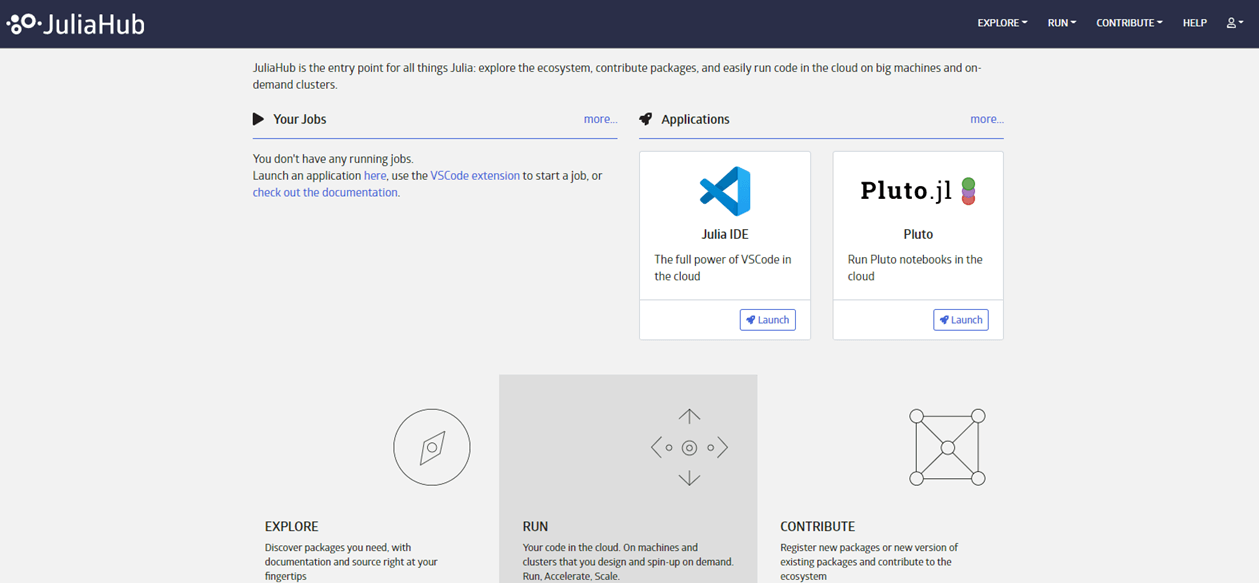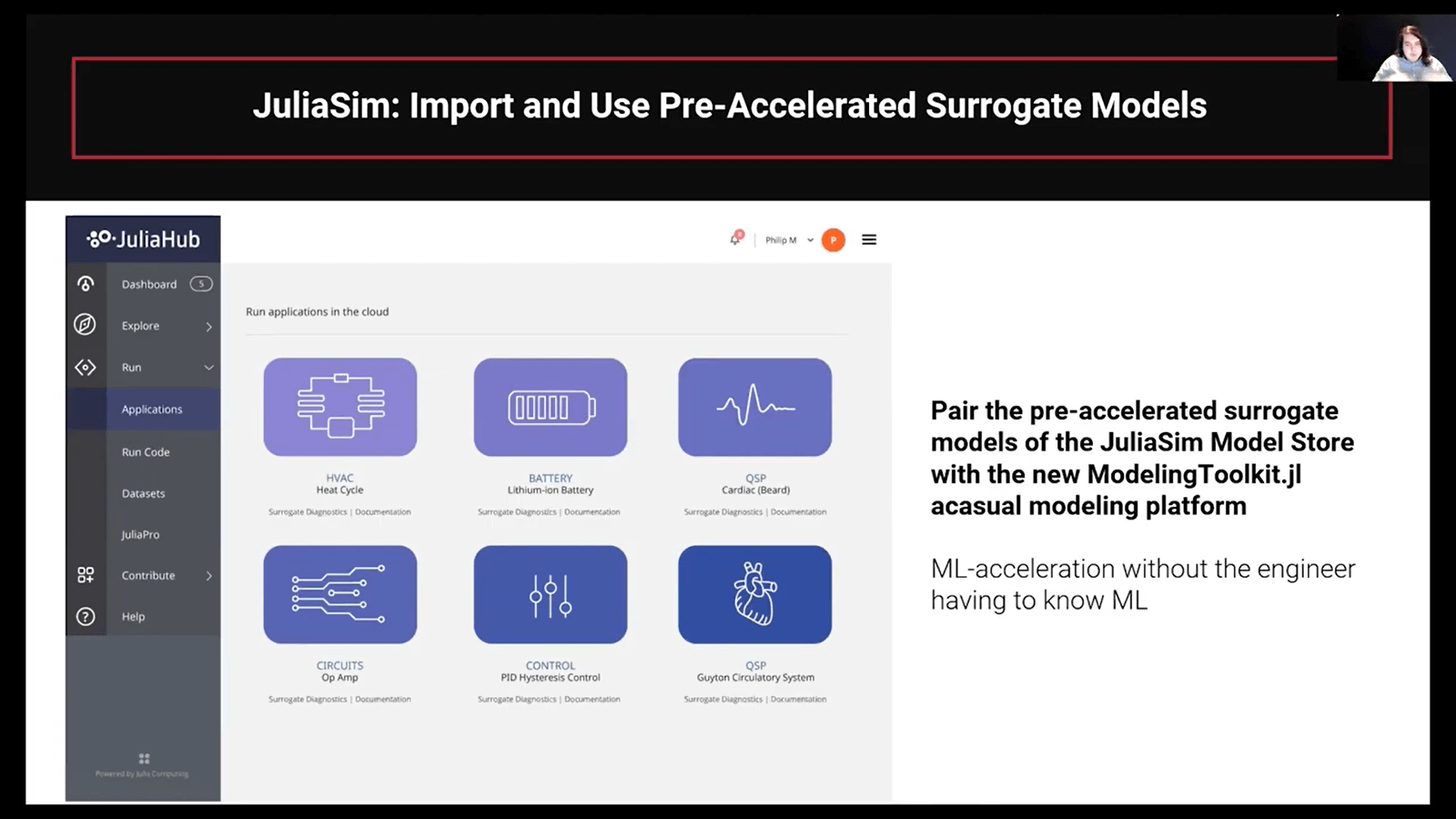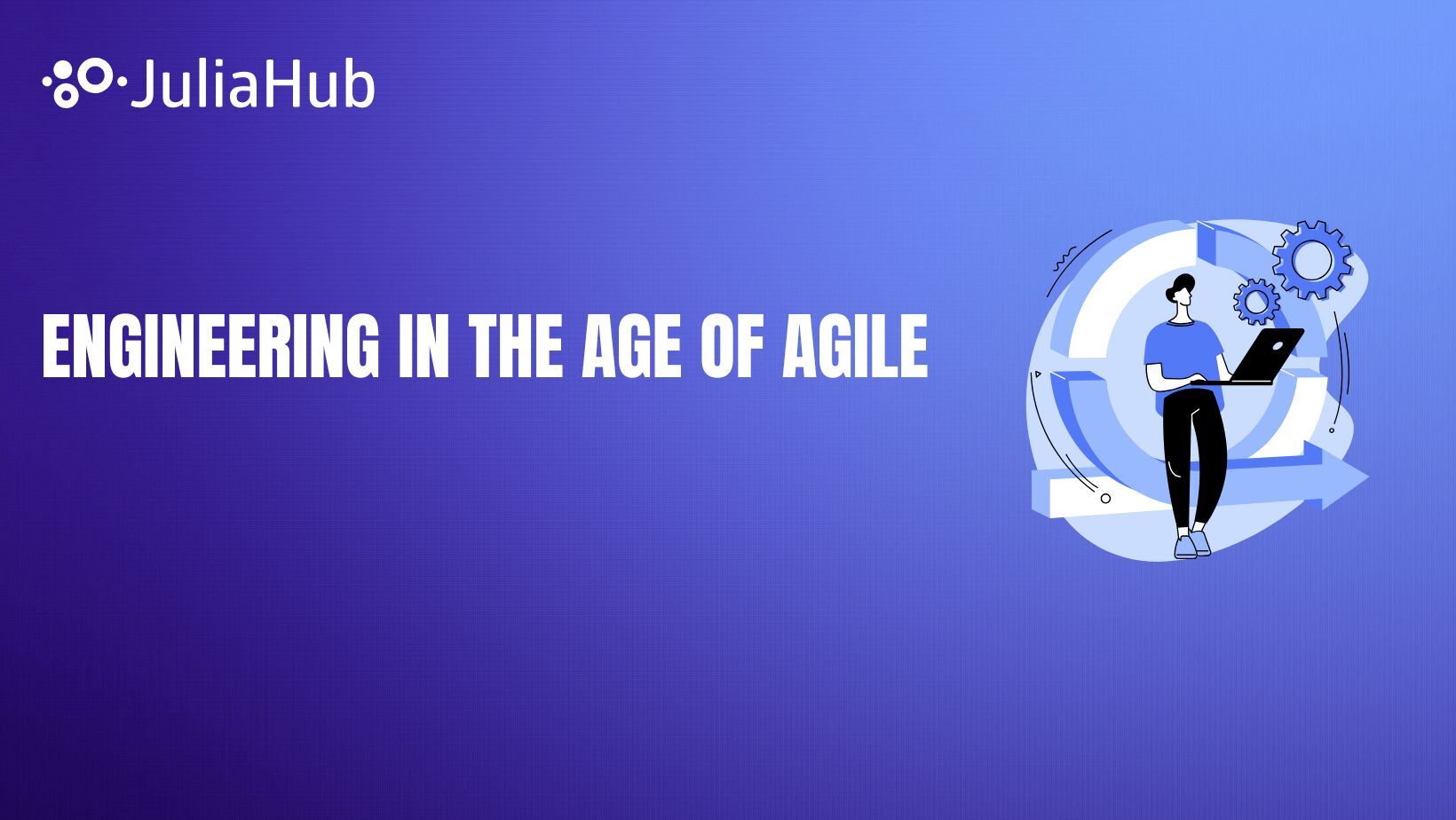Newsletter July 2021 - JuliaCon Workshops Start Today! Julia Computing Raises $24 Million in Series A.
JuliaCon 2021 - Free and Online - July 28-30 - Register Today
-
Free Registration: JuliaCon 2021 will be free and online. Last year’s JuliaCon brought together 30,000 online participants from over 115 countries. Click here to register.
-
Julia User & Developer Survey: Julia users and developers are invited to complete the annual Julia User & Developer Survey now. Survey results will be presented during JuliaCon. Click here to respond to the survey, make your voice heard and be counted as part of the Julia community. The last day to complete the survey is Tuesday July 6. The survey is available in English, Chinese, Japanese and Spanish. Chinese users may also choose to respond via qq using this link. The results of last year’s survey are available here.
-
Sponsorship: JuliaCon is an excellent opportunity for sponsors to support and show their support for Julia. Platinum, gold and silver sponsorships are available. Current and recent JuliaCon sponsors include Julia Computing, RelationalAI, PumasAI, Conning, Invenia, QuEra, KAUST, Packt, NumFOCUS, Amazon, Facebook, Google, Microsoft, Intel, Nvidia, JP Morgan, Capital One, BlackRock, Gordon and Betty Moore Foundation, Juspay, Zapata, University of Maryland School of Pharmacy, Jeffrey Sarnoff, Alfred P. Sloan Foundation, Replit, Maven, Gambit, Tangent Works, Alan Turing Institute, EVN, Maven and Voxel8.
-
JuMP-dev: JuMP-dev 2021 will also be free and online, and co-located with JuliaCon July 28-30. Click here to register and for more information.
JuliaHub from Julia Computing: JuliaHub is the entry point for all things Julia: explore the ecosystem, build packages and deploy a supercomputer at the click of a button. JuliaHub also allows you to develop Julia applications interactively using a browser-based IDE or by using the Pluto notebook environment and then scale workloads to thousands of cores. Version 5 features a brand new user interface, reduced app startup latency, and many more usability enhancements. JuliaHub is the easiest way to start developing in Julia or share your work using dashboards and notebooks. A free JuliaHub tutorial from Dr. Matt Bauman (Julia Computing) is available on YouTube.
Dyad (Formerly JuliaSim): Dyad is a next generation cloud-based modeling and simulation platform, combining the latest techniques from scientific machine learning with equation-based digital twin modeling and simulation. Dr. Chris Rackauckas presented Accelerating Simulation of Stiff Nonlinear Systems Using Continuous-Time Echo State Networks with Dyad (Formerly JuliaSim). Click here for more information.
Pumas from Pumas-AI: Pumas is a healthcare analytics platform facilitating quantitative capabilities across the drug development cycle. It is designed from the ground up in Julia to allow users to scale, integrate and accelerate their quantitative scientific activities all under one umbrella. Pumas is a product of Pumas-AI and deployed only through the JuliaHub platform from Julia Computing to leverage JuliaHub's ease of use and scalability. Julia Computing is a development partner and reseller of Pumas. Click here for more information.
Free Webinars from Julia Computing: Register today to participate in a free one hour Webinar from Julia Computing.
| Webinar | Presenter(s) | Length of Webinar | Date | Time | Registration Link | Cost |
| Pluto Notebook Support on JuliaHub | Dr. Matt Bauman, Julia Computing Director of Applications Engineering | 1 hour | Thu Jul 15 | 12 noon - 1 pm Eastern (US) | Register | Free |
| Package Compiler and Static Compilation in Julia | Kristoffer Carlsson, Julia Computing Software Engineer | 1 hour | Tue Aug 17 | 12 noon - 1 pm Eastern (US) | Register | Free |
| GPU Programming in Julia | Dr. Tim Besard, Julia Computing Software Engineer | 1 hour | Thu Aug 26 | 12 noon - 1 pm Eastern (US) | Register | Free |
Converting from Proprietary Software to Julia: Are you looking to leverage Julia’s superior speed and ease of use, but limited due to legacy software and code? Julia Computing and our partners can help accelerate replacing your existing proprietary applications, improve performance, reduce development time, augment or replace existing systems and provide an extended trusted team to deliver Julia solutions. Leverage experienced resources from Julia Computing and our partners to get your team up and running quickly. For more information, please contact us.
Julia Computing Jobs: Julia Computing is looking to hire a Wireless Systems Research Engineer, Cloud Engineer, Product Manager and Sales Engineer. For more information and to apply, please click here.
Julia Programming for Nervous Beginners: The newest JuliaAcademy course is now live: Julia Programming for Nervous Beginners from Dr. Henri Laurie. All JuliaAcademy courses are free.
CUDA.jl 3.3: CUDA.jl is the main programming interface for working with NVIDIA CUDA GPUs using Julia. As Tim Besard explains in a new blog post: “There have been several releases of CUDA.jl in the past couple of months, with many bugfixes and many exciting new features to improve GPU programming in Julia: CuArray now supports isbits Unions, CUDA.jl can emit debug info for use with NVIDIA tools, and changes to the compiler make it even easier to use the latest version of the CUDA toolkit.” According to Viral Shah, “CUDA.jl 3.3 brings some very interesting possibilities. Support for union types paves the path for DataFrames.jl on GPUs, debug information, computational graphs, and CUDA 11.3 support. Really excited about native #julialang for data manipulation on GPUs.”
Julia for Crypto: Dean Markwick’s new blog post “Getting Started with High Frequency Finance using Crypto Data and Julia” provides an introduction to quantitative finance topics and access to cryptocurrency data using Julia.
Artificial Intelligence Accelerator Award for Scientific Machine Learning in Julia: Chris Rackauckas received the Artificial Intelligence Accelerator Award from the US Air Force Artificial Intelligence Accelerator for “developing innovative computational processes to accelerate the simulation of nonlinear systems using neural networks”. Chris’s presentation to the Association for the Advancement of Artificial Intelligence Combining Machine Learning with Physical Sciences Symposium, “Accelerating Simulation of Stiff Nonlinear Systems using Continuous-Time Echo State Nets” is available on YouTube. For more information, visit SciML.ai or Dyad (Formerly JuliaSim). Related papers include:
-
Accelerating Simulation of Stiff Nonlinear Systems Using Continuous-Time Echo State Networks
-
Composing Modeling and Simulation with Machine Learning in Julia
“Accelerating Quantitative Systems Pharmacology with Machine Learning” Presented at Society for Mathematical Biology: Chris Rackauckas (Julia Computing) presented “Accelerating Quantitative Systems Pharmacology with Machine Learning” to the Society for Mathematical Biology. More information is available here.
“Accelerated Large-Eddy Simulation via Universal Partial Differential Equations” Presented at Society for Industrial and Applied Mathematics Conference on Mathematical & Computational Issues in the Geosciences (GS21): Chris Rackauckas (Julia Computing) presented “Accelerated Large-Eddy Simulation via Universal Partial Differential Equations” to the Society for Industrial and Applied Mathematics Conference on Mathematical & Computational Issues in the Geosciences (GS21). More information is available here.
“Accelerating the Simulation of Highly Stiff HVAC Systems with Continuous-Time Echo State Networks” at 16th U.S. National Congress on Computational Mechanics: Chris Rackauckas (Julia Computing) presents “Accelerating the Simulation of Highly Stiff HVAC Systems with Continuous-Time Echo State Networks” at the 16th U.S. National Congress on Computational Mechanics July 25-29. More information is available here.
Julia and Julia Computing in the News
-
TechXplore, Newswise: Julia Programming Language Tackles Differential Equation Challenges
-
TechTarget: Tanmay Bakshi Habla de Programación con Julia y Swift
-
CodeX: Is Julia Really Fast?
-
The Next Web: Why Python Is Not the Programming Language of the Future
Julia Blog Posts
-
Benchmarking push! in DataFrames.jl (Bogumił Kamiński)
-
How to Get Head or Tail of a Data Frame in DataFrames.jl? (Bogumił Kamiński)
-
How Much Do Collections of Allocated Objects Cost? (Bogumił Kamiński)
-
Getting Started with High Frequency Finance using Crypto Data and Julia (Dean Markwick)
-
CUDA.jl 3.3 (Tim Besard)
-
Analyzing International Football Results with Julia (Julius Krumbiegel)
-
Neural Hybrid Differential Equations (Frank Schäfer)
-
Optimizing Julia Code: Improving the Performance of Entropy-Conservative DG Methods in Trixi.jl (Hendrik Ranocha)
-
Optimizing Julia code: Improving the Performance of Adaptive Mesh Refinement with p4est in Trixi.jl (Hendrik Ranocha)
-
First YouTube Video Created with Javis (Ole Kröger)
-
Calling R From Julia (Josh Day)
-
From Julia to Rust (Miguel Raz Guzmán Macedo)
Upcoming Julia Events
-
Meetup: Julia - Data Model - A Conversation Built Around Types with Pleasanton Julia - Programming the Language Jul 2
-
Meetup: What Makes Julia the unPython? with Pleasanton Julia - Programming the Language Jul 3
-
Online Meetup: Share&Code Probabilistic Modelling with Turing.jl with Stephan Sahm and Julia User Group Munich Jul 5
-
Online Workshop: Introduction to Julia for Statistics and Data Science with Statistical Society of Australia, Victoria Branch Jul 8-9
-
Webinar: Pluto Notebook Support on JuliaHub with Dr. Matt Bauman (Julia Computing) Jul 15
-
Virtual Conference: Accelerating the Simulation of Highly Stiff HVAC Systems with Continuous-Time Echo State Networks with Dr. Chris Rackauckas (Julia Computing) at the 16th U.S. National Congress on Computational Mechanics Jul 25-29
-
Virtual Conference: JuliaCon 2021 and JuMP-dev 2021 Jul 28-30
-
Webinar: Package Compiler and Static Compilation in Julia with Kristoffer Carlsson (Julia Computing) Aug 17
-
Webinar: GPU Programming in Julia with Dr. Tim Besard (Julia Computing) Aug 26
-
Virtual Conference: Population Approach Group Europe (PAGE) with Julia Computing Sep 2-7
-
Virtual Conference: Modelica Conference with Julia Computing Sep 20-24
-
Virtual Conference: American Conference on Pharmacometrics with Julia Computing and Pumas-AI Nov 8-12
Recent Julia Online Events
-
Online Meetup: Flux.jl with Boulder Data Science, Machine Learning & AI Jun 10
-
Online Meetup: Bayesian Inference with Turing.jl with Stuttgart Julia Programming Language Meetup Jun 12
-
Virtual Conference: Accelerating Quantitative Systems Pharmacology with Machine Learning with Dr. Chris Rackauckas (Julia Computing) and the Society for Mathematical Biology Jun 15
-
Meetup: Julia - Why Not? With Pleasanton Julia - Programming the Language Jun 19
-
Virtual Conference: Accelerated Large-Eddy Simulation via Universal Partial Differential Equations with Dr. Chris Rackauckas (Julia Computing) and Society for Industrial and Applied Mathematics Conference on Mathematical & Computational Issues in the Geosciences (GS21) Jun 22
-
Webinar: Machine Learning with Multi-GPU Training with Dr. Matt Bauman (Julia Computing) Jun 23
-
Online Meetup: JuliaStats HypothesisTests.jl with Konstantinos Michailidis and Julia User Group Freiburg Jun 24
Julia Jobs, Fellowships and Internships
There are hundreds of Julia jobs currently listed on Indeed.com and JuliaLang Discourse.
Julia Computing is looking to hire a Wireless Systems Research Engineer, Cloud Engineer, Product Manager and Sales Engineer. For more information and to apply, please click here.
Liquid Analytics: Liquid Analytics is looking for Julia programmers:
-
Senior Machine Learning Computer Scientist: Modeling Business Problems with Julia
-
Senior Polyglot Software Engineer: Build Complex Machine Learning and Graph Systems with Julia
-
Software Engineer - Automation: Build Web Services, Applications and Microservices with Julia
-
Computational and Applied Mathematician: Probabilistic and Differential Programming with Julia
Do you work at or know of an organization looking to hire Julia programmers as staff, research fellows or interns? Would your employer be interested in hiring interns to work on open source packages that are useful to their business? Help us connect members of our community to great opportunities by sending us an email, and we'll get the word out.
Contact Us: Please contact us if you wish to:
-
Purchase or obtain license information for products such as JuliaHub, Dyad (Formerly JuliaSim) or Pumas
-
Obtain pricing for Julia consulting projects for your organization
-
Schedule online Julia training for your organization
-
Share information about exciting new Julia case studies or use cases
-
Spread the word about an upcoming online event involving Julia
-
Partner with Julia Computing to organize a Julia event online
-
Submit a Julia internship, fellowship or job posting
About Julia and Julia Computing
Julia is the fastest high performance open source computing language for data, analytics, algorithmic trading, machine learning, artificial intelligence, and other scientific and numeric computing applications. Julia solves the two language problem by combining the ease of use of Python and R with the speed of C++. Julia provides parallel computing capabilities out of the box and unlimited scalability with minimal effort. Julia has been downloaded by users at more than 10,000 companies and is used at more than 1,500 universities. Julia co-creators are the winners of the 2019 James H. Wilkinson Prize for Numerical Software and the 2019 Sidney Fernbach Award. Julia has run at petascale on 650,000 cores with 1.3 million threads to analyze over 56 terabytes of data using Cori, one of the ten largest and most powerful supercomputers in the world.
Julia Computing was founded in 2015 by all the creators of Julia to develop products and provide professional services for businesses and researchers using Julia.
About the Author

JuliaHub
Discover key content authored by JuliaHub experts. Stay updated on innovative practices in scientific and technical computing.







